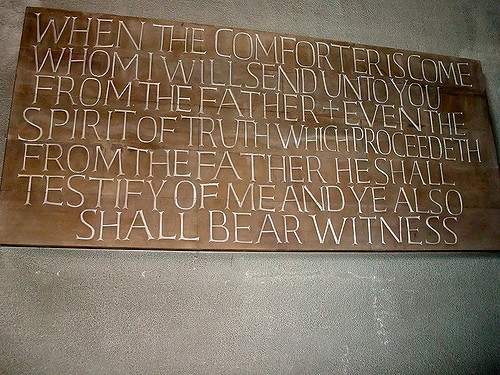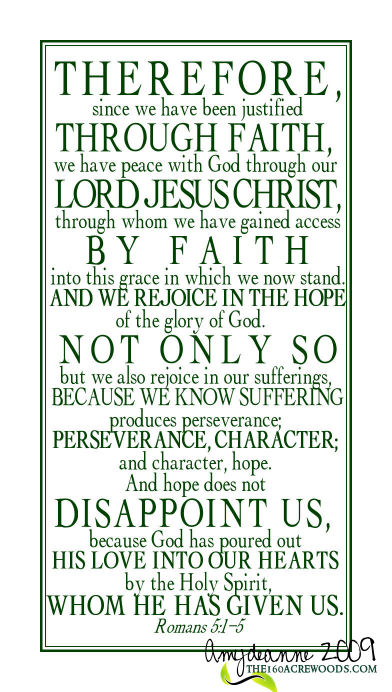 START WITH SCRIPTURE:
START WITH SCRIPTURE:
John 14:23-29
CLICK HERE TO READ SCRIPTURE ON BIBLEGATEWAY.COM
OBSERVE:
Jesus provides insight into the inner workings of the Trinity, and also reiterates the Great Commandment of love, and promises peace to those who follow him.
To be a follower of Jesus is not merely a matter of belief, but also obedient love.
Here’s the background for today’s Scripture passage. Judas (not Iscariot) has asked Jesus how he will reveal himself exclusively to the disciples:
Judas (not Iscariot) said to him, “Lord, how is it that you will reveal yourself to us, and not to the world?” (John 14:22)
Jesus answers:
“Those who love me will keep my word, and my Father will love them, and we will come to them and make our home with them. Whoever does not love me does not keep my words; and the word that you hear is not mine, but is from the Father who sent me.”
Jesus makes two truths very clear here. First — that those who truly love Jesus keep his commandments, and are loved by the Father for Jesus’ sake. And second — Jesus illustrates the intimate relationship he has with the Father.
Together, the Father and the Son will dwell within the disciple. And Jesus is very clear that what he teaches comes directly from the Father.
Jesus also forecasts his own departure by promising the coming of the Holy Spirit:
the Advocate, the Holy Spirit, whom the Father will send in my name, will teach you everything, and remind you of all that I have said to you.
Notice that the three Persons of the Trinity are all included here — the Holy Spirit is sent by the Father, but he is sent under the authority of Jesus (in my name), and the Spirit’s teaching will reinforce the teaching that Jesus has offered. The Holy Spirit is not going to bring a new teaching that is contrary to the teaching of Jesus.
The term Advocate has a specialized meaning. The Holy Spirit is the Paraclete, which means the Counselor — or more literally, One Who Stands Beside. (The term Advocate is frequently used today for attorneys in a courtroom who speak on behalf of their clients.)
Jesus is also very keenly aware that this is his last opportunity to teach and strengthen his disciples before he is arrested and crucified. So he wants to reassure them in the face of the coming stress:
Peace I leave with you; my peace I give to you. I do not give to you as the world gives. Do not let your hearts be troubled, and do not let them be afraid.
How can they possibly have peace, and be untroubled when Jesus is going to suffer so? Here is the answer. Jesus isn’t just going to die — he is going to be raised to life, and he will also come again at the end of the age:
You heard me say to you, ‘I am going away, and I am coming to you.’
Jesus recognizes his dependency on the Father:
If you loved me, you would rejoice that I am going to the Father, because the Father is greater than I.
But ultimately, Jesus is telling the disciples all these things so that when the drama unfolds they will be able to hang on:
And now I have told you this before it occurs, so that when it does occur, you may believe.
APPLY:
Faith is more than mere intellectual assent to a few well-crafted propositions. Faith is grounded in a relationship with God, and is expressed in loving obedience.
We see the relationship of the follower of Jesus expressed in the dynamic relationship of the Trinity:
Those who love me will keep my word, and my Father will love them, and we will come to them and make our home with them…But the Advocate, the Holy Spirit, whom the Father will send in my name, will teach you everything, and remind you of all that I have said to you.
Because of the follower’s relationship with God, the follower has faith, obedient love, guidance from the Holy Spirit, and peace when faced with uncertainty.
RESPOND:
Back in the 1970’s, when I was emerging from adolescence, this is the question that was posed by those inviting me to follow Christ:
Do you have a personal relationship with Jesus?
For a “cultural Christian” who had grown up in church, this was a startling question. What it meant was that faith was more than just a creed, or an affiliation with an institution. Faith became a matter of personal knowledge of Jesus.
Later, I realized that when I submitted to follow Christ, the entire Godhead had come to dwell in my life. That was a radical realization!
But that is exactly what Jesus promises us:
Those who love me will keep my word, and my Father will love them, and we will come to them and make our home with them.
For those who had grown up in a fairly arid religious environment, this was indeed Good News!
Lord, I thank you that you have come to dwell in my life, and have made a home within me. Empower me to trust in you, to love you, and to express my love in obedience to you. And grant me your peace. Amen.
PHOTOS: ""Peace I Give to You..." ~ digital paint effect" by Art4TheGlryOfGod by Sharon is licensed under a Creative Commons Attribution-NoDerivs 2.0 Generic license.

![On Jewish tombstones you will sometimes see a symbol showing two hands arranged for the Priestly Blessing. [Description and photo by elycefeliz]](https://soarlectionarybiblestudy.wordpress.com/wp-content/uploads/2016/04/6424721487_bb6eaa6c53_z.jpg?w=620&h=474)
![This mosaic from Ostia Antica gives one a glimpse of what a wealthy woman of Roman times, such as Lydia is said to have been, would have looked like. [Photo by Fr. Lawrence Lew, O.P.]](https://soarlectionarybiblestudy.wordpress.com/wp-content/uploads/2016/04/5774910823_50c5f84669_z.jpg?w=620&h=417)



